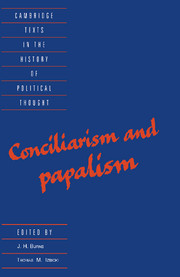Book contents
- Frontmatter
- Contents
- Editors' note
- Introduction
- A note on terms
- Chronology
- List of abbreviations
- Bibliography
- 1 On the comparison of the authority of pope and council
- 2 A book concerning the authority of the Church
- 3 The apology of Brother Tommaso de Vio … concerning the authority of the pope compared with that of the council
- 4 A disputation concerning the authority of the council over the supreme pontiff
- Index
- Cambridge Texts in the History of Political Thought
3 - The apology of Brother Tommaso de Vio … concerning the authority of the pope compared with that of the council
Published online by Cambridge University Press: 05 June 2012
- Frontmatter
- Contents
- Editors' note
- Introduction
- A note on terms
- Chronology
- List of abbreviations
- Bibliography
- 1 On the comparison of the authority of pope and council
- 2 A book concerning the authority of the Church
- 3 The apology of Brother Tommaso de Vio … concerning the authority of the pope compared with that of the council
- 4 A disputation concerning the authority of the council over the supreme pontiff
- Index
- Cambridge Texts in the History of Political Thought
Summary
Prologue setting out the reason, intention and order of the work
The charity of Jesus Christ and His holy Church, reverend father in Christ, protector and lord, compels me to follow in these things the example of Him Who, when He was reviled, did not revile [i Pet. 2:23], [not reviling Jacques Almain] a dangerous man, one who saps ecclesiastical power, a forger, a flatterer and a blasphemer, but to respond to his objections against the doctrine asserted on behalf of the truth in Opusculum de comparatione auctoritatis papae et concilii, published by me and dedicated to your most reverend lordship. Although many of the objections might easily be resolved by the said men, for whom alone, as I bore witness there, I wrote that work, nevertheless, because we, who are debtors to the wise and the less wise, should be ready to satisfy every one that asketh us a reason of that faith which is in us [cf. 1 Pet. 3:15], therefore, [our] replies must extend to the full range of the objections. It seemed a convenient order if the objections were brought forward and answered following the order of the chapters of my book; they will be then a kind of commentary on it.
I ask, therefore, first, that all should be mindful of formal speech and the subject matter and reflect maturely before expressing an opinion, lest the important subject under discussion should be reduced, by multiplying arguments out of intellectual vainglory, to [mere] dialectical or even sophistical disputation.
- Type
- Chapter
- Information
- Conciliarism and Papalism , pp. 201 - 284Publisher: Cambridge University PressPrint publication year: 1997



